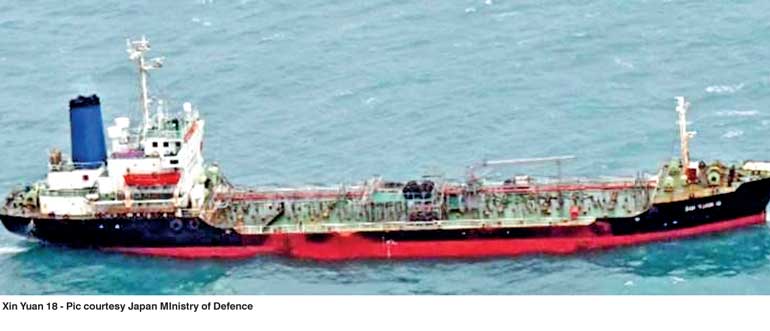Friday Feb 20, 2026
Friday Feb 20, 2026
Saturday, 3 March 2018 00:00 - - {{hitsCtrl.values.hits}}

Threats to the Abdulla Yameen regime in the Maldives from the outside world appear to be greater than those emanating from the country itself.
The internal situation in the archipelago of 1,200 islands is well under control, partly on account of the regime’s strong arm methods and partly account of an indifference generated by the disappointing conduct of all political parties and State institutions since democracy was ushered in in 2008.
While Yameen ensures stability, albeit with an iron hand, the opposition might usher in an era of instability and infighting among diverse political groups.
Domestic dilemma
The daily Maldives Independent carries a story bringing out the dilemma of the man in the street. Talking of the 1 February ruling of the Supreme Court which freed nine top opposition leaders sentenced for terrorism, murder, bribery, etc., 27-year-old Moosa Hassan said: “The average Maldivian does not benefit from this ruling. Much like other Supreme Court rulings, it was politically motivated. The difference is that this time it favors the opposition.”
Meanwhile, 18-year old Izana Ahmed said: “I do not think some of the opposition figures wrongfully convicted deserve to be freed. That being said, I also think a fair trial is necessary for them.”
She and others spoke of the selective nature of justice. The court had only ordered the release of high-profile inmates.
The young people interviewed did not feel represented by any one politician or party and none of them had connections to any of the country’s political parties.
“I am not sure who I’m supposed to reach out to at this point,” said 23-year-old Anisa Mohamed. “None of the MPs listens to people. It’s not easy to get a hold of them anyway. It’s hard to protest against the Government without accidentally supporting the Opposition that you don’t really believe in. There’s no political leader who seems to care about anything I do,” Anisa said.
“I don’t feel connected at all. Not even the MDP (Maldivian Democratic Party) is helping the people’s cause here,” said 19-year old Saleema Ali.
“Since Nasheed left, I don’t believe the MDP has tried to pump out another aspiring leader. Rallying behind someone is admirable, yes, but not thinking of the future is what’s hurting them.”
Anisa added: “The current crisis is the most helpless I’ve felt. The 2012 coup really destabilised the country, and I really feel people wanted some calm and stability after all the chaos that ensued. That’s one of the reasons people are not motivated to protest. That and the opposition is useless. Perhaps things will change in the next election.”
Threats from outside
However, threats from outside are more formidable because these are rooted in geo-political or regional and world power games. The competing power blocs demand that the Maldives go their particular ways. Maldives, like other weak countries, is unable to take the road of its choice without creating anxieties in one power bloc or the other.
It’s Yameen regime’s lurch towards China since he came to power in 2013, which has irked the Western powers and regional power India. China’s emergence as the single largest aid giver and investor in the Maldives outside the tourism sector is creating, among other powers in the region and beyond, an anxiety that their supremacy in the Eastern India Ocean region is under an unprecedented threat. The belief is that China could convert its economic hold into a political and strategic hold and bolster its strength in the Eastern Indian Ocean.
Opposition icon and former President Mohamed Nasheed’s call for an “Indian military backed diplomatic intervention” was the first to cause anxiety in the Yameen regime. While New Delhi did not react at all, the Indian media and “experts” went to town recalling Operation Cactus of 1988 which interdicted Sri Lankan Tamil militants trying to overthrow the then Maldivian President Maumoon Abdul Gayoom.
However, India did eventually say that it expects Yameen to implement the 1 February order of the Maldivian Supreme Court “in letter and spirit”; release the named opposition leaders; restore the independence of the judiciary and the Rule of Law. But there was no word about any kind of intervention. Perhaps India left this to the UN, whose offer Yameen had accepted in principle.
To keep the pot boiling, the Western media carried stories of a small put powerful Chinese flotilla having entered the Indian Ocean and moving toward the Maldives. Although Male should have felt assured by the supposed Chinese movement, it created another kind of tension for it. No one in the Maldives, other than the opposition, wanted the country to become a theatre of war or a playground for international power play.
The Yameen Government issued statements saying that there was no Chinese naval presence in Maldivian waters. Reassuringly, the Indian media too quoted “defence officials” as saying that the said Chinese fleet had been 3,500 km away from the Maldives and had already quit the area.
Alleged breaking of sanctions
While the Western world and India were worried about Chinese military moves, Japan came up with pictorial evidence about a Maldives registered vessel, Xin Yuan 18, breaking UN Security Council sanctions against North Korea by transferring fuel to a North Korean vessel off Shanghai on the Chinese coast.
On its part, the Maldivian Democratic Party (MDP) led by Mohamed Nasheed issued a statement saying that oil tanker Xin Yuan 18 “appears to be linked to Maldivian President Abdulla Yameen’s family”.
“Documents viewed by the opposition show that the Xin Yuan 18 is owned by Ha Fa Trade International, a company based in Hong Kong. A Maldivian company called Green Box, which is owned by Colonel Ziyad, applied for a mortgage at the Bank of Maldives worth $ 4.5 million. The Xin Yuan 18, along with property belonging to Adheel Jaleel, was used as collateral for the mortgage,” the NDP statement said.
“Adheel Jaleel is President Yameen’s nephew. Green Box’s owner, Colonel Ziyad, is a former Colonel in the MNDF, and a close confidant of General Shiyam, the Chief of the Defence Forces.
“The Maldivian Democratic Party is extremely concerned that President Yameen has been caught up, once again, in an illegal scheme to smuggle oil in violation of UN sanctions. In the early 2000s, President Yameen was head of an international smuggling ring that provided oil to the Burmese military junta, in breach of UN sanctions.
“A case against Yameen for fraud was lodged in a court in Singapore. However, days before the case was due to be heard in 2012, President Nasheed was deposed in a coup d’etat. The Grant Thornton investigation was terminated by the administration that replaced President Nasheed.”
 Maldives denies
Maldives denies
The Maldivian Government categorically denied all the charges. It said in a communiqué: “The Government of Maldives assures that the Maritime Mobile Service Identity (MMSI) number 455910000 associated with the vessel named Xin Yuan 18 was never registered in the country. The MMSI is an internationally-recognised 9-digit identification number which is used to identify maritime communication and vessels.
“While the MMSI range for the Maldives is 455XXXXXX, there is no record of the MMSI number 455910000 ever being registered in the Maldives.
“The Communications Authority of Maldives (CAM) administers the registration of all communication equipment on maritime vessels, as well as the issuance of all call signs and numbers. CAM only issues MMSI numbers to vessels registered by the Maldives Transport Authority.
“The Government of Maldives also confirms that the vessel ‘Xin Yuan 18’ is not registered in the Maldives.
“Further we condemn, in the strongest possible terms, the use of our National Flag in a manner so as to tarnish the good standing and reputation of our nation and that of our people.
“The Maldivian authorities do not allow flag of convenience to foreign-owned vessels to operate outside Maldivian waters.
“The Government of Maldives gives high priority to the implementation of all resolutions of the United Nations Security Council, including the Resolutions on Democratic People’s Republic of Korea (North Korea).
“The Administration is currently investigating the matter and wishes to make clear that the Maldives will pursue aggressive action against any such acts which affects the national identity in such a detrimental manner,” the statement said.